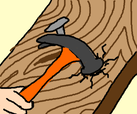weekly column
|
Each week, find a commentary on something connected to verses of Torah or another source of wisdom
|
|
Each week, find a commentary on something connected to verses of Torah or another source of wisdom
|
 The Last of Deuteronomy Therefore, when the Lord your God grants you safety from all your enemies around you, in the land that the Lord your God is giving you as a hereditary possession, you shall blot out the memory of Amalek from under the heaven. Do not forget. Deuteronomy 25:19 Deprived of movie theaters and live venues during this pandemic, we spend a lot of time watching movies and streaming series on television. There is a limited universe of actors, and inevitably we will recognize someone from something else we have watched. Olivia Coleman, for example, seems to be in every British production of the last ten years. Binge-watching may be an unusual way to learn an existential lesson, but I have come to a better understanding of the difference between remembering and not forgetting (likewise, forgetting and not remembering) in the two most frequent questions my wife and I ask each other in front of the TV. The first is “did we see that already?” The second is “what was she in?” The first question is about forgetting. If a movie or show has made a lasting impression on us, it will come to mind when we see the title or, often, any snippet from it. I can rattle off dozens of my most unforgettable movies, including “Casablanca,” “The Wizard of Oz,” “Animal House” and, believe it or not, “Phantasm.” (I was so scared after a late-night showing of that movie that I drove straight home, not bothering with streets.) There is no effort in recalling what I haven’t forgotten. The pleasure or, God forbid, trauma has taken up residence in an accessible place in memory. The tragedy of memory loss includes the deterioration of that automatic response. The second question is about remembering. With or without a hint of recognition, remembering is an active process of retrieval. Where did I see that baby-faced actor who played Benny in “The Queen’s Gambit?” There is an almost physical effort involved as I mentally scan the scenes in which his image flickers until I figure it out. (Oh, yeah. Thomas Brodie-Sangster, the kid in “Love Actually,” minus the ‘stache.) Re-member-ing literally involves putting pieces back together, some of which are more accessible and some much less. What does it take for an experience to be unforgettable, to live close enough to the surface that it is with us constantly? There is a better chance of it when strong emotion is attached or, similarly, a profound sensory encounter. Witnessing the desert awaken to the morning sun, the passionate telling by a friend of his conversion, the sound of laughter after reciting an original joke, the electric anticipation when my courage overcame my insecurity as I leaned into my first kiss – these are unforgettable experiences. I do not have to be instructed “do not forget.” They are resident and accessible. So, too, are traumas, both physical and emotional. Like the hammer that misses a nail and leaves an impression on the wood, a blow to the heart or to the body makes for a visceral memory that is right at the surface. Light will reflect, liquid will pool, dust will collect differently, with or without intention. It is logical, even sensible, to encourage someone whose memories are painful to try to forget. After all, the constancy of that unforgettable memory can take over an entire life and even lead people to repeat the familiar but undesirable behavior. An entire discipline of medicine is devoted to relieving rather than reliving. Amalek, mentioned in the verse, was the hammer that purposely missed the nail. The trauma of gratuitous violence against the small and lesser-abled – Amalek’s crime – left its indelible mark on the generation that fled from oppression. To be sure, they would never forget. But the atrocities were visited only on that generation, and so to prevent them from being committed by some other Amalek, they had to be remembered. The story had to be told because the pain would eventually be forgotten. It seems to be a paradox – remember so as not to forget. The pain of our recent sufferings will not be forgotten. But if we are to prevent them from being repeated in the future, then it is important that we don’t forget to remember.
0 Comments
Leave a Reply. |
Archives
October 2023
Categories |